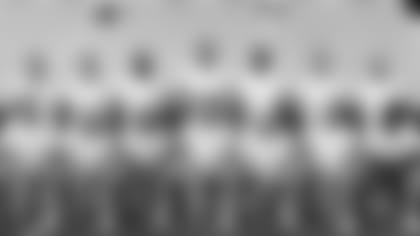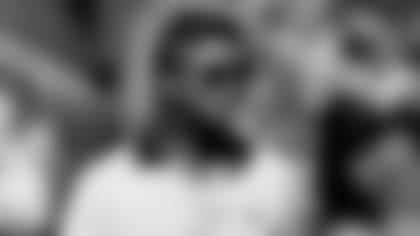*As part of the Green Bay Packers' celebration of the 10th anniversary season of the Super Bowl XXXI Championship, Packers.com is running a series of stories about the people responsible for bringing the Vince Lombardi trophy back home to Titletown.
No one will ever forget the Green Bay Packers' playmaking offense and record-setting defense in 1996, which is understandable considering they helped bring the Lombardi Trophy home to Green Bay.
With playmakers such as Brett Favre, Antonio Freeman and Edgar Bennett moving the ball down the field on a consistent basis and Reggie White, Eugene Robinson, and LeRoy Butler preventing the opponent from doing just that, there are several reasons to fondly recall the team's dynamic offense and stingy defense.
However, it would be nearly impossible to forget about the excitement and game-changing plays the special teams were responsible for that season in Green Bay.
Much like a Favre touchdown or a White sack, a Desmond Howard punt return could swing the game in a matter of seconds. The 5-foot-10, 180-pound returner had one of the best seasons in the history of the Green Bay Packers as well as the entire NFL.
If it wasn't a timely punt return for a touchdown, it was a long return that would swing the momentum in the Packers' favor. No matter what the situation was, opponents always had to account for Howard on every punt and if given even the smallest crease, he had a knack of making magic.
Special teams coach Nolan Cromwell had a gift of his own, which was teaching the proper techniques and getting his players in the right position to make plays. Obviously, Howard had a special ability to make great things happen, but there's no doubt that both his teammates and Cromwell also played an instrumental role in the team's success.
Yet, it's difficult to give Cromwell too much credit because he doesn't necessarily want to hear it. He eludes praise similarly to how Howard eluded tacklers. Instead, he'd rather talk about the unselfishness of the players he guided that season.
"There weren't a lot of individuals trying to get individual statistics," Cromwell explained. "We didn't have that on that team. It was 'Hey, whatever it takes to win, let's win.'
"Everybody wants their yards, everybody wants their catches, everybody wants their interceptions, all this stuff, but the bottom line was, 'Let's win.' It really permeated throughout the team in that era."
This attitude coupled with Cromwell's tutelage established a remarkable unit. Howard was the first-ever special teams player to be named MVP of the Super Bowl when he broke the game open with a 99-yard kickoff return for a touchdown near the end of the third quarter.
He finished the day with 154 yards on four kickoff returns as well as 90 yards on six punt returns. His combined 244 yards established a Super Bowl record as well.
This kind of success took place in the playoffs when the team needed it the most, but the fact is the production was there all season long.
After all, Howard finished the season with league highs in punt returns (58) and punt return yards (875). His 15.1 average is still the best in team history and his three touchdowns returning punts during the regular season is also a team mark.
Cromwell admitted that this level of success wouldn't have been possible if players hadn't accepted their roles. Instead of sulking over not having a starting job on offense or defense, Cromwell said these players took pride in being a starter on special teams.
"I think everybody bought into it," Cromwell explained. "I think when the team was assembled, each year, everybody on offense and defense knew their role.
"And if you were not a starter, because really, we didn't use starters on special teams -- I'd use one here or there depending on the situation as a safety or something like that -- that was your role. And that was your way to contribute to the football team."
Cromwell said it wasn't a tough sell to get players that could have started on other teams to play such a significant role on his units.
"I think it was one of those things where they just wanted to play," Cromwell said. "And if they could play 20 to 25 snaps a game on special teams, well heck, they're playing a good third of the game.
"Then we started having success early with Desmond on the return game and that just kind of ignited the group in there. And it was kind of an attitude that that particular person was not going to miss his block and let his guy make the tackle on Desmond Howard. And all of a sudden, everybody was really working to maintain their blocks and do it right. And the people who were unblocked, those were Desmond's. And he had the ability to make people miss."
According to Cromwell, Howard was such a student of the game that he would hold others accountable for missed blocks.
That leadership, combined with the unit's desire to break the big one and Howard's uncanny ability to see the field, made for quite a season -- one that Cromwell won't forget anytime soon.
"As an entire unit, there's no question that was the best group I have ever been with," Cromwell said. "And I think a lot of it was the excitement that permeated by Desmond standing up and telling everybody, 'You get your block and I'll make the rest of them miss.'
"And he knew who was blocked and who was not blocked on every return. He could just about tell you the number of the guy that was unblocked. Because he'd come off and say for an example, 'Nolan, who is supposed to have No. 50?'
Cromwell admits that he was spoiled to have worked with such a great group in his fifth season with the team.
"As a special teams coach when you've got a group of guys like Lamont Hollinquest, Jeff Thomason, Bernardo Harris, Travis Jervey, Chris Hayes, you know you could go down the list of the guys I had and you go 'Wow,'" Cromwell gushed.
According to Cromwell, it certainly didn't hurt to have a player of Howard's caliber, either.
"He had a great understanding of what we were trying to do," Cromwell recalled. "Everybody did. And knew how we wanted it done. And they were good enough athletes to execute it.
"Every one of them made their block. There are always people you cannot block. And the way I did my returns, I didn't have everybody blocked. The returner had to make a couple guys miss."
Despite the team's success, Cromwell wouldn't go so far as to say that he expected Howard to break a big return. Instead, he said they just focused on making the right blocks and hoping for the best.
"I think we all knew we were going to get a good return," Cromwell explained. "When I talked to the team a good return is 10 yards or plus, and that was our goal. Because I knew if we could get 10, usually you've kind of broke through the main cover proof, and once you got that far, Desmond could do his thing."
Howard and a few of his teammates said after the Super Bowl that they were surprised New England took the risk of putting the ball in the punt returner's hands.
Cromwell, on the other hand, said the Patriots' strategy was just about what he expected. And needless to say, he's happy Howard received the opportunity to make a difference.
"New England had really good special teams going into that game," Cromwell said. "I knew it was going to be a good battle for us to do it, but I think the way they punted the ball, they wanted to put you on the sideline, rather than put it right down the middle. They punted it in a direction so they could collapse the field.
"On kickoff returns, we were a solid unit, but we weren't breaking them like on punt returns. We had a couple returns (for touchdowns) and a couple good returns, but we just got the right blocks at the right time. And Desmond split a couple guys and actually broke one tackle and it was history from there."
It's understandable that fans and players alike remember Howard's magnificence as the highlight to the special teams unit. But one aspect that maybe fell under the radar a little bit was the kicking game, particularly the work of punter Craig Hentrich.
"For me, Craig Hentrich was the best guy I could have had at the time I had him," Cromwell marveled. "Chris (Jacke) was a solid kicker too, but Craig could kick and punt both. It was really a great relationship. He fit right with football. You hear the type of thing where kickers aren't really football players, but he was a football player and he made a ton of huge punts and kicks for us throughout his career. That was amazing.
"When we had him on the developmental squad in '92, I thought he was a better kicker than a punter. So he was very talented. And you know, I could watch Craig and tell him things that I think he's doing and he could tell me how to correct them. So, he really taught me more about the kicking game, as far as how to kick and punt the ball, than anybody I had been around."
Cromwell thoroughly enjoyed his time in Green Bay and said that he still has a lot of friends in the area. He acknowledged that he watches the Packers "all the time."
The fact that his special teams units played key roles in the team's Super Bowl-winning season will always be a source of pride, especially since it all took place in a city like Green Bay.
"It was very gratifying to a special teams coach and to the special teams players that we contributed to a lot of wins throughout the year, and especially during the Super Bowl," Cromwell said. "It was great. And it came at the right time.
"But the other thing I think was the fans at Green Bay, they appreciate the game of football. They really have a sense that things can happen on special teams, good and bad. And they understand it and I think as a majority they have a feeling that that is a big part of the game, which it is.
"We had enough success and enough big plays that their anticipation as fans, they were anticipating a good game on special teams for us."
Clearly, the fans got that and then some in 1996.















